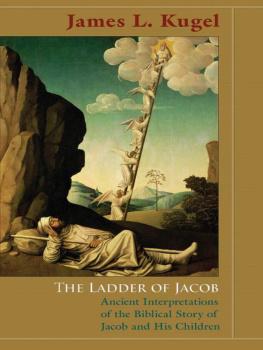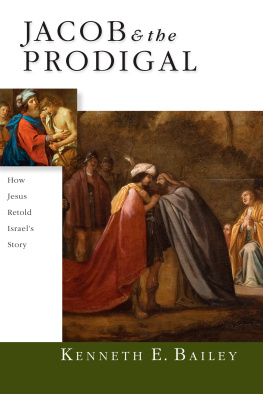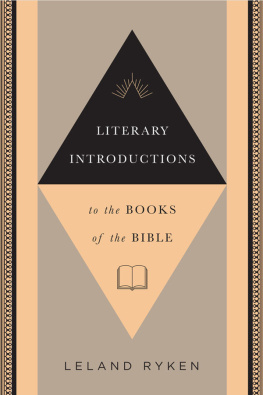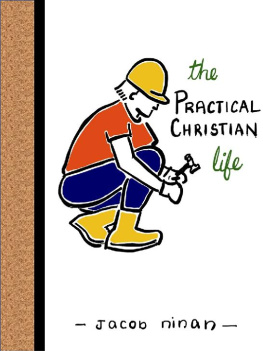JACOB

Jacob
Unexpected Patriarch
YAIR ZAKOVITCH
Translated from the Hebrew
by Valerie Zakovitch

Frontispiece: Santa Maria Maggiore Nave Mosaic (c. 435):Isaac Blesses Jacob.
Photograph copyright Holly Hayes/Art History images.
Copyright 2012 by Yair Zakovitch.
All rights reserved. This book may not be reproduced, in whole or in part, including illustrations, in any form (beyond that copying permitted by Sections 107 and 108 of the U.S. Copyright Law and except by reviewers for the public press), without written permission from the publishers.
Yale University Press books may be purchased in quantity for educational, business, or promotional use. For information, please e-mail sales.press@yale.edu (U.S. office) or sales@yaleup.co.uk (U.K. office).
Set in Janson type by Integrated Publishing Solutions.
Printed in the United States of America.
Library of Congress Cataloging-in-Publication Data
Zakovitch, Yair.
[Va-yavo Yaakov Shalem. English]
Jacob : unexpected patriarch / Yair Zakovitch ; translated from the Hebrew
by Valerie Zakovitch.
p. cm. (Jewish lives)
Includes bibliographical references and index.
ISBN 978-0-300-14426-0 (cloth : alk. paper)
1. Bible. O.T. Genesis XXXIII, 18-20 Criticism, interpretation, etc.,
Jewish. 2. Jacob (Biblical patriarch)
I. Zakovitch, Valerie. II. Title.
BS1235.2.Z3713 2012
222.11092dc23
2012019478
Catalogue records for this book are available from the Library of Congress and the British Library.
This paper meets the requirements of ANSI/NISO Z39.48-1992 (Permanence of Paper).
10 9 8 7 6 5 4 3 2 1
For Jeanette and Martin Carr,
with love
CONTENTS
ACKNOWLEDGMENTS
I WOULD like to extend my deep appreciation to Professors Anita Shapira and Steven Zipperstein, editors of JEWISH LIVES, for inviting me to contribute to the series and for their helpful guidance along the way. It has been a pleasure working with the superb staff at Yale University Press: Ileene Smith, editor-at-large; her conscientious assistant, John Palmer; the meticulous and ever-encouraging editor, Margaret Otzel; and the extraordinary manuscript editor, Kim Hastings. Finally, I would like to thank my beloved wife, Valerie, for her meticulous reading of my manuscript, for helping me to write for non-Hebrew readers of the Bible, and for her translation, which was done with precision and grace.
Yair Zakovitch
Passover 2012
INTRODUCTION
THE STORY of Israelite history that unfolds in the Pentateuch and Early Prophets stretches from the creation of the world to the peoples exile to Babylon. It describes the relationships between three sides of a (nonequilateral) triangle: the God of Israel, the people of Israel, and the Land of Israel. The question emerges: Why would this nation conceive their history as beginning with the creation of the world, the very beginning of time, when only one of the triangles sides existed? We could easily imagine beginning the account at another point, such as the meeting between the people and God in the wilderness, in the course of which God adopts the wandering nation as His progeny. This is the version told, for example, in the Song of Moses in Deuteronomy 32:
When the Most High gave nations their homes and set the divisions of man, He fixed the boundaries of peoples in relation to Israels numbers. For the Lords portion is His people, Jacob His own allotment. He found him in a desert region, in an empty howling waste. He engirded him, watched over him, guarded him as the pupil of His eye. Like an eagle who rouses his nestlings, gliding down to his young, so did He spread His wings and take him, bear him along on His pinions. (vv 811)
A second alternative might have been to open the history with the commencement of the Israelites Egyptian sojourn, as do a number of the historical psalms, for example, Psalm 106: We have sinned like our forefathers; we have gone astray, done evil. Our forefathers in Egypt did not perceive Your wonders; they did not remember Your abundant love, but rebelled at the sea, at the Sea of Reeds (vv 67).
The choice of opening with the Creation was also puzzling to a number of rabbinic sages, who are referred to by the eleventh-century biblical commentator Rabbi Shlomo Itzhaki (known as Rashi), at the beginning of his Torah commentary:
Rabbi Isaac said: The Torah should have begun with That month is for you the Head of the months (Exod 12:2), which is the first commandment with which Israel was commanded. What was the reason for opening with In the beginning? Because He revealed to His people His powerful works, in giving them the heritage of nations (Ps iii:6), that if the nations of the world were to say to Israel, You are robbers! You conquered the lands of the seven nations [of Canaan], [the Israelites] would say to them, The whole world belongs to the Holy One, blessed be He. He created it and gave it to whomever He saw fit. When it was His will, He gave it to them. When it was His will, He took it from them and gave it to us.
Rashis explanation seems both incomplete and arbitrary. To respond, we should probably add, first, another question: Why do the nations forefathers take so long to step onto the stage of history? Were they hibernating while the rest of humanity had already awakened to the dawn of history? Consider that when Abraham, the forefather of the Hebrew nation, and his wife Sarah take their first, hesitant steps onto the proverbial stage, there already existed, according to the Book of Genesis, sizable and developed nations, societies ruled by powerful kings.
The answer, according to the Hebrew Bible, is that a deliberate hand prevented the Israelites from entering the world prematurely, and it did so in order that they might learn from the experiences of othersin order to recognize how the earlier generations paid for their sins against God and to draw the relevant conclusions from these events, from the expulsion from Eden because of Adam and Eves eating the fruit of the Tree of Knowledge (Gen 3) to the dispersion of the worlds population and the confusion of languages following a failed attempt to build a tower with its top reaching to heaven (11:19). Indeed, for these actions of the ancientsfor these attempts to be like Godthe first generations were punished with exile. And truly: had the Israelites learned from the past, they might have avoided the exile that awaits them at the end of the Book of Kings. Instead, they closed their eyes from seeing and sealed their ears from hearing and troubles befell them. Signs that hung in the air from the earliest days of Genesis are then realized in the grim reality of the destruction of the Kingdoms of Israel and Judah, and all who disregarded the warnings implicit from the earliest days will now, perhaps, begin to comprehend that the justice of Gods dominion is in both the distant past and the bitter present.
The opening chapters of Genesis also assign Israels place in the Book of the line of Adam (5:1) and, actually, in the line of the sons of Noah (10:1), where we learn how Canaanthe eponym of the land in which the nation will later dwellwas a descendant of Noahs son Ham (v 6), while Abraham, the forefather of the Israelites, is a son of Noahs other son, Shem (11:10 ff.). The genealogy teaches how Israel shares nothing with the nation whose land will come to be theirs. All this was designed to dissociate the Israelites from those whom they resembled most, and to argue for the uniqueness of Israelite culture. Indeed, the Bibles historical books are crucial components of the Monotheistic Manifesto, the programmatic statement and argument for the belief in one God that is the Hebrew Bible, which sought to disengage and remove the Israelites from the culture and beliefs of Canaan, a nation still caught in the swampy mires of polytheism.
Next page










